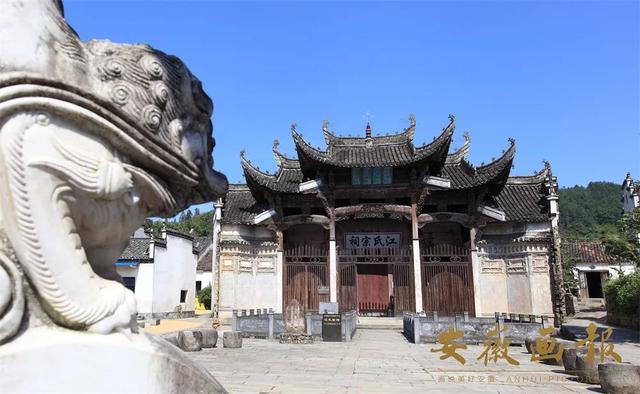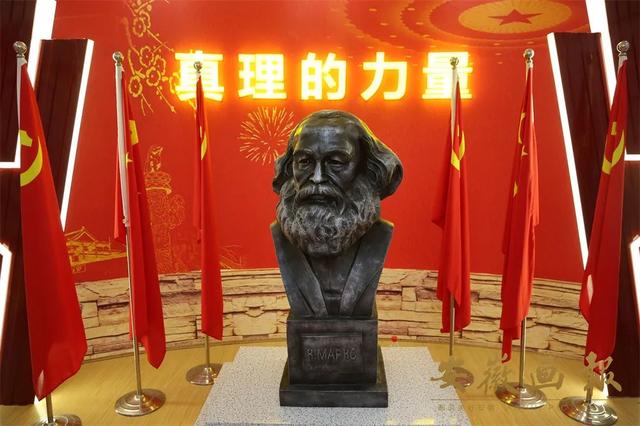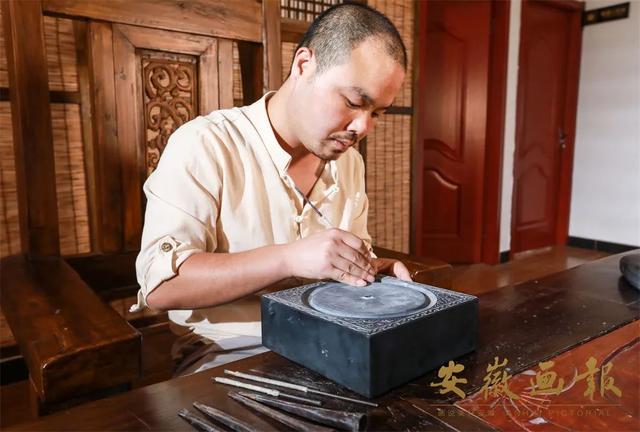

编者按
绘风华安徽,润江淮秀色。安徽省政府新闻办联合安徽画报社重磅打造“风华正安徽
”栏目,以中英文形式呈现安徽各地市(区、县)自然风光、人文历史、经济发展、生态旅游等内容,更好呈现江淮大地蓬勃发展的新气象,讲好安徽故事,让在安徽生活、工作的外籍读者更加了解安徽,让安徽走出国门。本期推出“旌德”篇。
皖南小城旌德,寄意“旌表贤能,彰扬礼德”。
这是一座千年古县,建县于唐宝应二年(763年),至今已有1250多年历史。
这里有国际慢城之称,恬淡、静谧、安宁是她的气质。
旌德云上梯田 / Terraced fields under white clouds, Jingde
Jingde is a small city in the south of Anhui, with its name suggesting that it is a place to honor able and virtuous personage and carry out traditional rituals and morality.
Jingde is a millennium county with a history of more than 1,250 years. The county status was chartered in the second year of Baoying period in the Tang Dynasty (763).
Jingde is known as an international slow city. As it is sparsely populated, the life there is unsophisticated, peaceful and tranquil.
01 历史悠久,文风昌盛
文庙、古塔、古桥、古亭、古道、牌坊,见证了旌德历史的沧桑与厚重。
江村江氏宗祠 / Jiang Clan Ancestral Hall, Jiangcun Village
黄山东麓余脉逶迤盘亘,造化出万壑竞秀、千溪争流的古邑旌德。这里四季分明,气候宜人,被誉为长三角地区的后花园。全县辖10个镇 , 面积904.8平方公里,人口15万,面积和人口大约都是中国的万分之一。
旌德文庙 / Jingde Confucius Temple
“走不完的石板路,看不完的马头墙”,这里是徽文化的发祥地之一,有着深厚的历史积淀和文化传承。境内历史遗存众多,有“旌德江村”和“旌德文庙”两处全国重点文物保护单位。旌歙古道是“中国十大徒步古道”之一。皖南古村落朱旺是安徽省重点文物保护单位,“井水不犯河水”成语源于此地。拥有宣砚制作技艺、古法油烟墨制作技艺、旌德漆画、打棍求雨习俗、云乐灵芝炮制技艺、天山真香茶叶手工制作技艺等十多项省市级非物质文化遗产。
旌德历代名人辈出,元代县尹王祯编著《农书》、发明木活字,铸就“两座世界丰碑”,其发明木活字并印刷的《旌德县志》是世界上第一部用木活字印刷的书籍。“人痘接种法”发明者江希舜、近代词媛吕碧城、中国第一个红色县长谭梓生、革命烈士江上青、经济学家朱剑农、数学泰斗江泽涵、文坛巨匠周而复等都是旌德的骄傲。
江村世科坊 / Shike Gateway in Jiangcun Village
Long history and profound cultural elements
The Confucian Temple, time-honored pagoda, archaic bridges and pavilions, as well as ancient roads and archways have witnessed the vicissitudes and profound history of Jingde.
The winding extension of the eastward range of Mt. Huangshan has left the ancient city of Jingde a captivating topography featuring numerous gullies and streams. Thanks to the four distinct seasons and pleasant climate, the county is dubbed as the backyard of the Yangtze River Delta. Now, under its jurisdiction are 10 towns covering a total area of 904.8 square kilometers and with a population of 150,000. Both the land area and the population are roughly about one ten- thousandth of those of China.
木活字印刷馆/Wood movable type printing houseWood movable type printing house
In Jingde, you can never walk away from the flagstone paved roads and you can never complete the counting of "horse-head" walls (similar to corbie gables for fire protection). As one of the cradles of Hui culture, the county boasts deep sediment of historical elements and rich cultural heritage. There are many historical remains in the county. Jingde Jiangcun Village and Jingde Confucian Temple are the two cultural heritage sites under national protection. The Jinghe Ancient Road is one of the "top ten oldest trekking routes in China". Zhuwang, an ancient village in southern Anhui, is a key cultural unit under provincial protection.
The saying "the well water should not interfere with the river water" originates here, which means everyone should mind their own business. The intangible cultural heritages listed by the provincial and municipal governments have totaled about a dozen, including the techniques for making oil soot ink sticks in an ancient way, for making Xuanyan ink slabs and Jingde lacquer paintings, and the preparing process for Yunle lucid ganoderma and the manual production skills for Tianshan- brand fragrant tea, as well as the custom of rain praying by beating sticks.
旌德文庙内举行开笔礼/The opening ceremony for the class of writing in Jingde Confucius Temple
Jingde is reputed for many talented people in different dynasties. Wang Zhen, a mayor of the county in the Yuan Dynasty, compiled Nong Shu (a book on agriculture) and invented wood movable types, casting "two world monuments". The Jingde County Annals printed with the movable types is the first book ever printed in the similar way in the world. Jingde is proud of having many important figures in modern Chinese history, including Jiang Xishun, inventor of human- pox vaccination, Lyu Bicheng, a female modern Ci poet, Tan Zisheng, the first Communist mayor of a county in China, Jiang Shangqing, a revolutionary martyr, Zhu Jiannong, a famed economist, Jiang Zehan, a master mathematician, Zhou Erfu, a literary giant, and Jiang Dongxiu, wife of Hu Shi (Hu Shih).
02 黄山之脉,国际慢城
旌德距离黄山风景区仅30公里,是黄山天然的东大门。旌德站,也是京福高铁沿线距离黄山风景区最近的高铁站。
旌阳镇是安徽省首个、全国第六个“国际慢城”。
映山红迎客来 / Azalea in full bloom welcome visitors
来到旌德,你可以登上梓山,去倾听大自然的天籁之音;可以走近徽水,去探索小溪流的天道之行。可以在街头巷尾品尝地道的徽菜,在徽水两岸领略经典的灵芝文化和宣砚文化。
旌德境内重峦叠翠,满目青山绿水,全县林地面积97.7万亩,森林覆盖率69.2%,是长三角负氧离子含量最高的区域之一、历史上从来没有下过酸雨的地方。由此,被国务院纳入重点生态功能区,创成国家级生态县、全国绿化模范单位、中国森林氧吧、中国森林康养基地、安徽省森林城市。
旌德高铁站 / Jingde High-speed Railway Station
旌德积极推进全域旅游示范区及国家文明旅游示范区创建,宜居宜游,全县A级以上景区达55个,县城28.46公里慢城绿道环线贯通,北纬30°界碑成为皖南川藏线南入口新地标。
International slow city by Mt. Huangshan
Jingde is only 30 kilometers away from the Mt. Huangshan Scenic Area. Geographically, it is the east gate to the magnificent mountain. Although located in the hinterland of the Yangtze River Delta, Jingde serves as an important transit venue for a great many tourists heading to southern Anhui. By the way, Jingde Railway Station is the high- speed railway station along the Beijing-Fuzhou high-speed railway nearest to the Mt. Huangshan Scenic Area.Jingyang Town is the first accredited international slow city in Anhui and the sixth in China.
朱旺民俗花轿迎亲/Zhuwang Village custom: Carrying the bride in a sedan chair to the home of her bridegroom
In Jingde, you may hike to Mt. Zishan to enjoy the sounds of nature, you may approach the Huishui River to explore the natural courses of its tributaries, you may taste authentic Huizhou cuisine on the streets, and you may enjoy the classic Lingzhi (lucid ganoderma) culture and Xuanyan (ink slab) culture on both sides of the Huishui River.
In Jingde, what we see are ranges upon range of green mountains, as well as limpid waters in flowing. The forest land area of the county is 977,000 mu, and the forest coverage rate is 69.2%. It is one of the areas with the densest negative oxygen ion content in the Yangtze River Delta and has never had acid rain in history. Therefore, the county was included in the list of the key ecological functional areas by the State Council. As of now, the county has made the lists of the national ecological counties, national greening model units, Chinese forest "oxygen bars", Chinese forest-based health and wellness bases, and Anhui's forest cities.
旌德开展健康慢城活动 / Jingde's Healthy 'Slow City' activity
Jingde is good for both living and traveling and it is now actively upgrading itself into an all-for-one tourism demo area and a national tourism model demo area. There are 55 scenic spots rated above Grade A in the county. The 28.46 km "slow city" greenway in the county is open now to traffic and the boundary tablet at 30° north latitude is a new landmark at the south entrance to the Sichuan-Tibet Highway in southern Anhui.
03 红色旌德,五个“第一”
革命战争年代,旌德的地方党组织带领革命群众,用鲜血和生命开创了安徽党史上的五个“第一”:全国唯一一尊马克思银像;皖南第一个中国共产党支部;第一个由共产党员担任的县长;“四一二”反革命政变后,旌德党组织发动了第一次革命武装暴动;皖南事变后,打响反击国民党反动派的第一仗。
皖南第一个党支部纪念馆/The memorial museum dedicated to the first Party branch in southern Anhui
1923年11月,旌德三都梅村小学教师梅大栋应安源路矿中共党员李延瑞函约,到江西安源路矿担任职工子弟学校教师,并于1924年1月加入中国共产党。当时,曾在江西安源路矿工作的中共党员肖劲光被派到莫斯科东方劳动者共产主义大学和列宁格勒军政学院学习。学习结束后,他将共产国际于1924年10月赠送给中国共产党的一尊马克思银像带回安源路矿。这尊马克思银像(高15.5厘米、重250克)系纯银浇铸的半身塑像,与像座、底座同为一体,像座正面铸有俄文“卡尔·马克思”,底座下方铸有俄文“第6,莫斯科”。
此时,刘少奇担任安源路矿工人俱乐部总主任,就将这尊马克思银像交给梅大栋保管。1925年9月,安源党组织遭到反动军阀的破坏。在梅大栋离开安源之前,刘少奇郑重地嘱咐他,希望他把马克思银像保管好,安全地带回皖南。梅大栋乔装打扮,10月份终于安全回到家乡。返回旌德后,梅大栋积极开展革命活动,创办农民夜校,建立党的支部。
放大后的马克思银像塑像 / An enlarged replica of the silver statue of Karl Marx
1927年,蒋介石发动“四一二”反革命政变后,大肆逮捕和杀害共产党员,1928年10月,梅大栋和胞弟梅大梁不幸被捕,梅大栋越狱逃离,梅大梁惨遭杀害、壮烈牺牲。反动当局查封了梅大栋家的住房。梅大栋的母亲宋坤荣,冒着生命危险将马克思银像保存下来。如今,这尊银像珍藏在旌德县档案馆,以此为脚本而创作的电影《第六号银像》将于近期上映。
Five 'firsts' in the 'red' heritage of Jingde
During the revolutionary war, the people in Jingde under the leadership of local Party organizations had at their cost of blood and life five "firsts" in the history of the Communist Party of China in Anhui, i.e. the one and only silver statue of Karl Marx kept in China, the first branch of the Communist Party of China established in southern Anhui; the first communist county mayor appointed in China; the first revolutionary armed uprising organized by local Party organizations after the April 12 Counter-revolutionary Coup in 1927, and the first battle waged in China against Kuomintang reactionaries after the Southern Anhui Incident in 1941.
In November 1923, at a written invitation by Li Yanrui, a member of the Communist Party of China in Anyuan Railroad and Mines, MeiDadong, a teacher with the primary school of Sandumei Village, Jingde, went to the company in Jiangxi to teach at the school for children of workers. He joined the Party in January 1924. At that time, Xiao Jinguang, also a Party member working in the company, was sent to study at the Moscow-based Communist University for Toilers of the East and Leningrad Military-Political Academy. After the training, he brought back to Anyuan Road and Mines a silver statue of Karl Marx presented in October 1924 by the Communist International to the Communist Party of China. The statue is a bust cast in pure silver, with the pedestal and the base together in a whole piece. On the front of the pedestal is "Karl Marx" in relief, and on the base "the 6th, Moscow", both in Russian. At that time, Liu Shaoqi, the then general director of the workers' club of Anyuan Road and Mines, gave the statue to Mei Dadong for safekeeping. In September 1925, the Party organization in the company was destroyed by a reactionary warlord. Before Mei left Anyuan, Liu Shaoqi solemnly asked him to keep well the statue and bring it safely to southern Anhui. In disguise, Mei Dadong finally returned home safely in October the same year. In Jingde, Mei continued revolutionary activities actively. He established a night school for farmers and organized a Party branch.
乡民筹资兴建的大梁广场 / Daliang Square built with the fund raised by local farmers
In 1927, after Chiang Kai Shek launched the April 12 Counter- revolutionary Coup, many communists were arrested and massacred. In October 1928, Mei Dadong and his brother Mei Daliang were unfortunately arrested. Mei Dadong escaped from prison, but Mei Daliang was killed. The reactionary authorities sealed up Mei Dadong's house. Mei Dadong's mother Song Kunrong managed to save the statue at the risk of her life. Now, the silver statue is stored in Jingde County Archives Center. A film "Silver Statue No. 6" adapted from the story will be released before the end of this year.
04 灵芝吐秀,宣砚凝香
旌德是中国灵芝之乡、中国宣砚之乡和全国第一批“绿水青山就是金山银山”实践创新基地。
旌德灵芝 / Jingde lucid ganoderma
旌德素有“徽州粮仓”之美誉,物产富饶。灵芝、茶叶、甘蔗、花生、黄精、菊花、香榧、黄牛肉等特产久负盛名。拥有梅花鹿、云豹、银杏、红豆杉等国家级重点保护动植物。“旌德灵芝”等获评国家地理标志农产品,“旌德大米”“旌德皇菊”列入第一批全国名特优新农产品名录。
路西空中茶园 / Mountain top tea plantation, Luxi
宣砚闻名遐迩,而它被重新发现则经历了一番波折。古代宣砚的生产地点在旌德县白地镇洪川村,如今仍可看到古老的采石坑遗址。2010年7月,白地镇突降暴雨,洪川村龙潭山洪水成灾,罕见的泥石流将山溪里埋藏的砚石冲出了地表,失传已久的千古名砚才重见天日。宣砚石被发现以后,相关部门完成了宣砚砚石88项理化指标的地质检测分析,成功申请保护开发旌德县白地镇龙潭山砚矿,经安徽省地质矿产勘查局332地质队的地质普查,初步查明了矿石资源量110.33万立方米,可供开采制砚数百年。
宣砚温润如玉、涩不留笔、发墨光润。李白曾七到宣城,对宣砚情有独钟,曾写下“笺麻素绢排数厢,宣州石砚墨色光”。
Lucid ganoderma, inkstone and other local specialties
Jingde is a nationally recognized producer of lucid ganoderma and the birthplace of Xuanyan ink slabs in China. It is also one of the first designated innovation bases in China to put into practice the conviction that "lucid waters and lush mountains are invaluable assets".
宣城工匠张明在雕刻宣砚/Zhang Ming, a craftsman in Xuancheng, is engraving a Xuanyan ink slab
Jingde has long been acknowledged as the "granary of Huizhou". Additionally, it has a wide range of local specialties known far and near, including but not limited to lucid ganoderma, tea, sugar cane, peanut, sealwort, chrysanthemum, Chinese torreya, and yellow cattle beef. The fauna and flora species under national protection it boasts include sika deer, clouded leopard, ginkgo, and Chinese yew. Jingde Ganoderma is a national geographical indication agricultural product. Jingde Rice and Jingde Chrysanthemum have been listed in the first catalogue of the national famous, special, excellent and new agricultural products.
Xuanyan Ink Slab is famous far and wide, but the rediscovery and verification of the source area of the raw material is not so easy and time-consuming. In ancient times, Xuanyan ink slabs were produced in Hongchuan Village, Baidi Town, Jingde. Now, we can still see the ancient quarry site. In July 2010, a sudden rainstorm poured on Baidi Town, bringing torrential flood from Mt. Longtan to Hongchuan Village. Incredibly, the debris flow flushed the earth away from the deep-buried quarry and the site came to our view after over 1,000 years in oblivion. After the discovery of the quarry, relevant departments carried out a series of geological determinations and analyses of the slab samples on 88 physical and chemical indicators. In following, the application for protecting and developing the quarry was approved. According to a geological survey completed by Team 332 under Anhui Provincial Bureau of Geology and Mineral Exploration, the preliminarily found mineral reserve is 1,103,300 cubic meters, which can be used for the production of ink slabs for hundreds of years.
旌德县城全貌 / A bird's-eye view of Jingde urban area
The finished ink slab resembles jade in texture, the grinding surface of the slab is properly coarse and does not affect a writing brush absorbing the ink in it smoothly, and the ink produced in the slab has a tint of luster. Li Bai visited Xuancheng seven times. As he was so fond of the ink slab produced there, he even put it into his poems, praising the Xuanyan ink slab for the gloss of the ink produced in it.
05 “筑巢留才”,幸福家园
旌德县注重产业发展和人才建设,近年来大力实施“筑巢”“外引”“归巢”“双创”“内培”“留才”六大工程,逐步形成“高精尖缺人才引进、农村能人回归、走出去引才”的局面,以“四剂良方”疏通人才回归“梗阻”。
安徽黄山胶囊股份有限公司 / Anhui Huangshan Capsule Co., Ltd.
人才回归助力企业腾飞,安徽黄山胶囊股份有限公司成为全县首家在A股上市企业;旌德特色小镇建设成果显著,白地宣砚小镇入选首批中国特色小镇,获批省级电商示范镇;云乐灵芝小镇入选宣城市第一批特色小镇。
胶囊生产车间 / A workshop producing capsules
健康产业集聚发展新基地、长三角休闲旅游目的地、“小而美、小而精、小而优”养生慢城……这些,将是旌德的新名片,“旌德之治”,幸福家园,正在此处。
Improving living conditions for talents and make Jingde a happy county
The government of Jingde County attaches great importance to industrial development and talent team building. In recent years, it has vigorously implemented six major programs to attract talent, namely, "improving living conditions", "recruiting talent from other places", "encouraging returning of local talent working outside of the county", "mass entrepreneurship and innovation", "local training", and "keeping local talent at home". As a result, high-quality and top-notch professionals in great demand have been introduced, able farmers have returned, and recruitment is carried out beyond the boundary of the county. "Four good prescriptions", i.e. talent database, soft introduction, hardware improvement, and emotional sincerity have been applied to ease the "obstruction" of the returning of local talent.
安徽飞翔电器机器人生产车间/A workshop producing robots, Anhui Feixiang Electric Co., Ltd.
The returned talented people have helped the upgrading and developmnet of local enterprises. For instance, Anhui Huangshan Capsule Co Ltd became the county's first A-share listed company. The signature town construction in Jingde has achieved remarkable results: Baidi Xuanyan (ink slab) Town, an approved provincial e-commerce demonstration town, has been included into the first batch of Chinese signature towns, and Yunle Lingzhi (lucid ganoderma) Town has been selected as a signature town in Xuancheng Municipality.
徽水河河心洲 / The islet in the Huishui River
Now the new business images of Jingde include a new clustering and development base for healthcare industry, a leisure tourism destination in the Yangtze River Delta, and a "small, beautiful, refined and excellent" slow city good for health preservation... In the prosperity of the county is the happy homestead!
版权须知:未经本刊书面许可,任何人或单位不得以任何形式转载、摘编本刊图文内容。
✬如果你喜欢这篇文章,欢迎分享到朋友圈✬
评论功能已开启,我们接受一切形式的吐槽和赞美☺
文字:孙婷
图片:江建兴 高斌 朱学文
翻译: 王冀皖
译审:Ma Cheng ( 英国)
编辑:吴承江
校对:刘 军
即日起,读者点击封面或微信留言即可征订或购买《安徽画报》
《安徽画报》创刊于1958年,是安徽省唯一一份大型政经文旅类高端期刊,由中共安徽省委宣传部指导、安徽出版集团主管,时代出版传媒股份有限责任公司主办。《安徽画报》立足主流宣传阵地,以美图美文美术美味传播安徽形象,讲好安徽故事,画说美好安徽。2017年复刊以来,先后被评为“中国最佳画报”“中国最佳媒体融合奖”“安徽省优秀期刊”“安徽重要外宣窗口阵地”“安徽省版权示范单位”等。
加入画报读者群
,




























